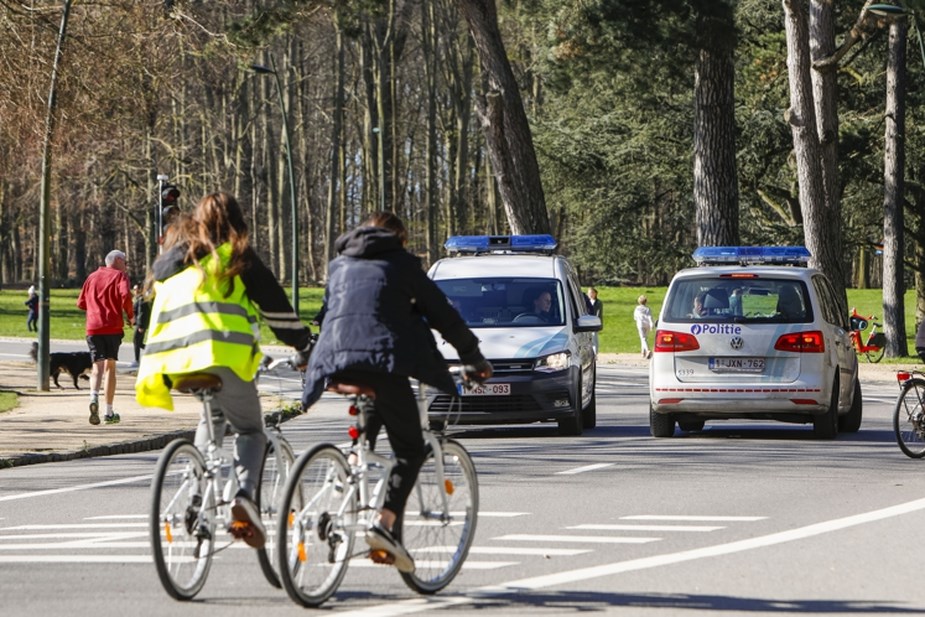Restricting motorists from a four-kilometer loop within the sylvan confines of a treasured urban park on the edge of a city with one of the worst European pollution problems would seem like a win-win change: cleaner air and improved public health. And considering that the same city is the capital of a European Union committed to a carbon-neutral economy to combat climate change, the elimination of a veritable motorway through this green oasis would seem like a bare minimum practice-as-you-preach measure.
However when the park restrictions occur in one of Brussels' wealthiest necks of the woods where the car is king and the use of public transport or car pooling are foreign concepts, the decision to close the Bois de la Cambre to automobiles has triggered a classic NIMBY (Not-In-My-Backyard) backlash.
I feel qualified to make that statement because I have lived on the edge of the park and the Foret de Soignes for more than two decades. During that time I have biked daily to my office in the European quarter. Twenty five years ago many of my fellow office workers questioned the sanity of making what they considered a life-endangering cycle commute through the Wild West.
And in some ways it was. Compared to Flanders – or the gold standard countries such as the Netherlands and Denmark – most of the Brussels cycle lanes were truncated pathways that often steered you towards a head-on car collision or into a sidewalk full of pedestrians. But having arrived in Brussels after two years cycling daily to-and-from my office at the United Nations Environment Programme headquarters in Nairobi I had learnt a thing or two about using sharp elbows to navigate through traffic chaos.
Fearless two-wheel engagement with traffic or not, I was taken aback by the car commuter culture in Brussels. This problem sunk in when I saw the five-lane highway that ran straight through the old European Parliament building. Indeed that oddity did not match up with the EU's ambition to lead the world in reducing auto emissions such as particulate matter, nitric oxide and carbon dioxide.
A quarter of century later the transformation of Brussels to a much more bike friendly city has been a revelation if not a revolution. These days I still get a cheap thrill out of cycling down dedicated cycle lanes along busy thoroughfares such as Avenue Louise, Boulevard General Jacques or yes if the even the infamous Rue Belliard. The new car-free zones in the Brussels center in around the Grand Place are just as rewarding.
But none of those changes occurred without fierce resistance – similar to the kind Brussels Mayor Philippe Close has faced after his decision to close the south loop of the Bois de la Cambre.
Commuters from upscale suburbs such as Waterloo, Rhode-Saint-Genese, Linkebeek and others that use the park as an access route to Brussels are some of the most vocal opponents. They have teamed with a minority group of residents living on the fringe of the park as well as some merchants along Chaussee de Waterloo to wage a well financed campaign. The commune of Uccle took up the case and argued in court that restricting cars from the south end of Bois de la Cambre has increased air pollution and caused severe economic damage for local commerce.
Both of those arguments are misleading and fail to grasp the bigger picture. Indeed there is some re-routed traffic inconvenience in and around the Bois de la Cambre but it is primarily a rush-hour problem that has existed for decades due to the presence of various nearby schools, including the European School its student body of more than 4,000 pupils.
The use of public transport, especially by suburban commuters, would go a long way to resolving some of these traffic problems. Similar to the cycle friendly changes of the past decade, the rail, bus and tram network in the area has improved significantly. I can attest to that as I use it regularly when not cycling as I jettisoned the car for good three years ago. It is possible to reach any part of town, including the airport, within 45 minutes.
That said the public transport network could be better especially if there was enhanced cooperation among the regional bus networks. It would also be improved if a Metro or a tram line extended along Chaussee de la Waterloo. But it is no secret that residents in this part of town blocked its arrival more than three decades ago.
The argument that the park closure is hurting local merchants is also dubious at best. Clearly the Covid pandemic has been a disaster for many Brussels retail businesses regardless of where they are located. But long before the arrival of the corona virus, the High Street commerce in the vicinity of the Bois de la Cambre and elsewhere has struggled.
Poor parking, the transition to online shopping and the inability of small businesses to compete against large food chains or merchandise stores are a few of the reasons. A sluggish economy over the past decade has also hurt.
Following the Nov. 13 ruling by the Brussels tribunal ordering the re-opening of the south loop of Bois de la Cambre to cars – the park has been opened to public transport and school buses for that past three months - Mayor Close and the city of Brussels must come up with a new plan in the coming weeks or face significant fines.
The compromise solution the city of Brussels should consider includes the kind of restrictions used in many other heavily congested urban cities around the world. One involves the use of High Occupancy Vehicle rules restricting access only to cars with minimum of two or three persons during morning and evening rush hour. Limiting access only to electric vehicles is another possibility.
Toll access fees in order to apply the polluter-pays-principle, which has been been the guiding principle behind EU environmental law for the past 30 years, is another policy option. However I doubt road tolls in this toney part of town would trigger the kind of carbon footprint reducing epiphany that we all must embrace in the face of the climate crisis.
By Joe Kirwin


